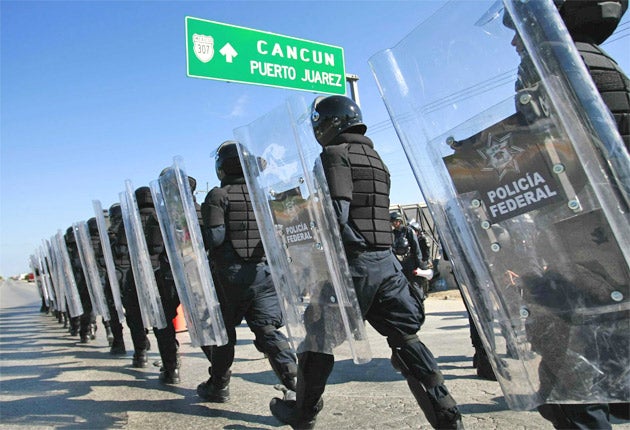Huhne asked to 'bridge Kyoto gap' between nations

Britain's Energy and Climate Change Secretary, Chris Huhne, was yesterday handed the job of solving the key problem which threatens the collapse of the UN climate talks in Cancun.
Mr Huhne has been asked by the Mexican organisers of the conference to try bridging the "Kyoto Protocol gap", between those countries that insist they will never sign up to a new period of Kyoto, the current climate treaty (such as the Japanese, Russians and Canadians) and those who insist that without a Kyoto extension, there can be no new climate deal (such as the Bolivians, the Venezuelans, the Chinese and the African countries).
The increasingly polarised dispute between rich and poor nations threatens the talks with the same impasse that led to the breakdown of the previous UN climate conference in Copenhagen last December.
Mr Huhne, who is leading Britain's delegation at Cancun, has been asked by the Mexicans to join with Brazil's Environment Minister, Izabella Teixeira, in holding discussions with the countries that have taken entrenched positions on Kyoto – particularly the Japanese on the one side and the radical South Americans on the other. Their task is to find a compromise way forward.
Mr Huhne and Ms Texeira saw all the key parties yesterday in a round of meetings. Some countries refused to budge. The Japanese were "robust in their line", a British source said, adding: "It's difficult. It was always going to be difficult." Both ministers will report on their progress to the full conference this morning.
Mr Huhne's task was not helped by uncertainty over whether he would have to fly back from Mexico for tomorrow's crucial Commons vote on tuition fees.
He has made it clear he is prepared to return to support the Government in the vote, depending on the whips' calculations of the arithmetic – which was being decided late last night – but if he were to come back he would have to leave today, with negotiations in which he is playing a crucial part poised at a very delicate stage.
His pulling out at such a key moment would leave many parties to the conference dismayed, to say the least. He and Ms Texeira are trying to look for the centre ground – if there is any. "The idea is to try to give the Mexicans a fairly good feel for where the real sticking points may be in different delegations, and where we might be able to negotiate our way through those particular problems," Mr Huhne said.
Signed in the Japanese city in 1997, the Kyoto Protocol has totemic importance for the developing countries, as it legally binds the industrialised nations to make cuts in their emissions of greenhouse gases, while not saddling the developing nations with similar commitments.
Kyoto's "first commitment period" runs out at the end of 2012, and the Japanese publicly insisted at the start of the conference last week, in unusually strong language, that they would not sign up to a second commitment period "under any circumstances". (It became clear later they were supported by Russia and Canada.)
Their declaration was met by a similar uncompromising announcement from the radical South American nations of the so-called Alba group, led by Bolivia and Venezuela. They made it clear that without a renewed Kyoto, there would be no new climate deal. The Alba countries said they had the backing of most of the developing world.
At stake is the possibility of taking forward the informal but new and important pledges to cut greenhouse gases which were part of the Copenhagen Accord, the patched-up last-minute deal salvaged by world leaders from the wreckage of the talks in the Danish capital. Also at risk is new treaty to prevent deforestation and setting up a new UN Green Fund to disburse $100m (£63m) per year.
Join our commenting forum
Join thought-provoking conversations, follow other Independent readers and see their replies
Comments
Bookmark popover
Removed from bookmarks